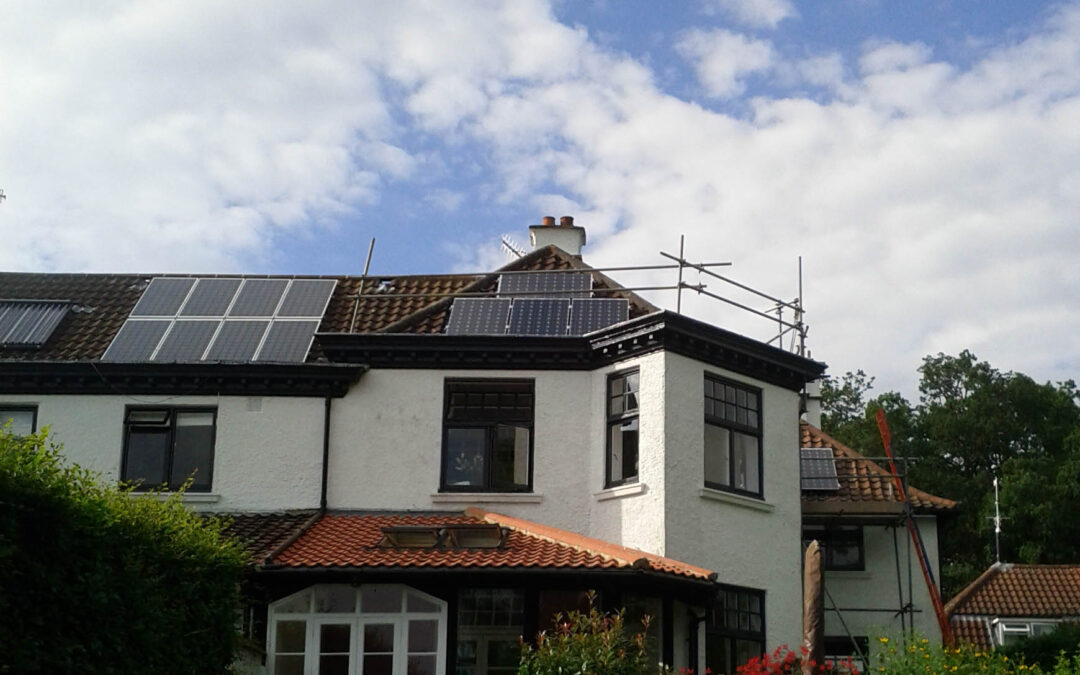Have you ever wondered whether your house roof is suitable for a solar photovoltaic installation? Follow a few rule of thumb points and get a better idea.
In domestic situations, the roof is usually the most appropriate location to install solar photovoltaic panels. This is because the roof slope is at a convenient angle and high enough to avoid serious overshadowing problems.
Roof Orientation
The main feature that will determine your house’s suitability for solar PV is the orientation of the roof slope. Solar PV panels are best installed facing due south, but any orientation on the southern quadrant of the compass can be used, even as far as the south-east or south-west. At these extremes, the electricity generating capacity will be reduced by a small, but acceptable margin.
Which Way is South?
If you have a copy of the house plans, there will usually be a north point from which you can easily establish south. If you do not have drawings, you will need to locate the direction of south with a compass.
Is the Roof Overshadowed?
It is important to ensure there are no obstructions that will block the sunlight from reaching the solar panels. Even a small amount of shading can reduce the performance of the whole system, not just that of an individual shaded module. Looking from the same height as your proposed solar installation, and working from east to west, check there are no obstacles such as trees or buildings that can obscure the sun at its lowest winter height.
Identify Obstacles
You should take into account the future growth of trees and shrubs, as vegetation may shade the system after only a few years. Look for other obstructions, as cables and aerials attached to the building can also cast a problem shadow over the proceedings.
Available Sunlight
In the UK, the amount of available sunlight varies with the geographical location of the site. For instance, there is more available light in the West Country than there is in Scotland. Furthermore, the light energy varies during the year with more daylight available in the summer and less in the winter.
Is Your Roof Pitch Suitable?
The high latitude of the UK means that the optimum roof angle for solar PV panels to achieve maximum performance is about 45 degrees. However, most domestic roofs have a shallower pitch than this, set at between 25 and 35 degrees tilt. The additional energy that would be gained by increasing the pitch of the array out of the plane of the roof would not normally be justified on either cost or appearance grounds. As a result, it is recommended that the solar PV array be installed at the existing pitch, provided this is not less than 25 degrees and not more than 60 degrees.
Is Your Roof Strong Enough?
Individual solar PV panels are not usually heavy, but when multiple panels are combined the weight can become significant. You will need to be satisfied that the roof structure is strong enough to carry the solar PV installation. You may need to arrange for an inspection by a local qualified building professional to establish this.
Storing the Photovoltaic Equipment
You will need to identify a suitable location to store the electrical equipment that comes with the PV installation. Ideally, the cables should be located within the structure of the pitched roof. The inverter and other electrical equipment can be placed in the roof void, if it is not being used. As far as possible, it is important to position the electrical equipment close together in order to keep the cable lengths as short as possible.
Solar PV Installers
When you are satisfied that your house is a contender for a solar PV installation you can then approach certified solar PV installers and obtain more detailed information and cost estimates for the work.

